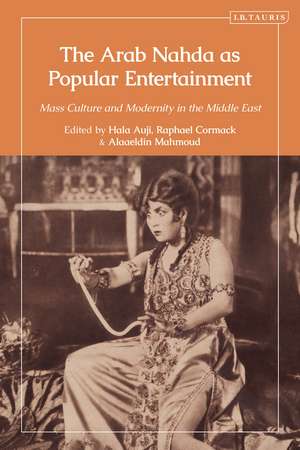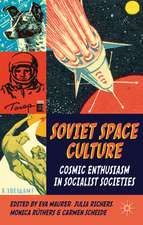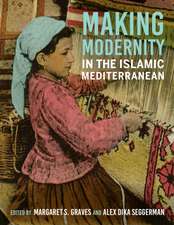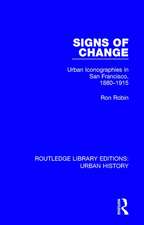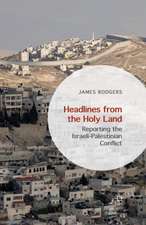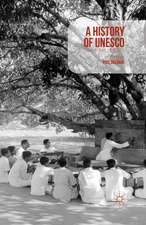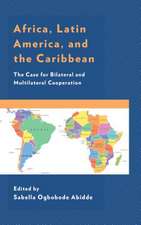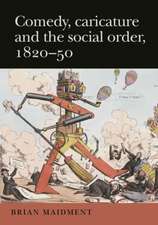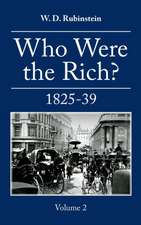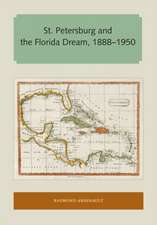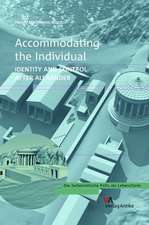The Arab Nahda as Popular Entertainment: Mass Culture and Modernity in the Middle East
Hala Auji, Raphael Cormack, Alaaeldin Mahmouden Limba Engleză Hardback – 13 dec 2023
Preț: 511.07 lei
Preț vechi: 731.59 lei
-30% Nou
Puncte Express: 767
Preț estimativ în valută:
97.81€ • 101.04$ • 81.40£
97.81€ • 101.04$ • 81.40£
Carte tipărită la comandă
Livrare economică 25 martie-08 aprilie
Preluare comenzi: 021 569.72.76
Specificații
ISBN-13: 9780755647408
ISBN-10: 0755647408
Pagini: 256
Ilustrații: 25 bw illus
Dimensiuni: 156 x 234 mm
Greutate: 0.54 kg
Editura: Bloomsbury Publishing
Colecția I.B.Tauris
Locul publicării:London, United Kingdom
ISBN-10: 0755647408
Pagini: 256
Ilustrații: 25 bw illus
Dimensiuni: 156 x 234 mm
Greutate: 0.54 kg
Editura: Bloomsbury Publishing
Colecția I.B.Tauris
Locul publicării:London, United Kingdom
Caracteristici
Opens up potential connections between the history of the nahda and the wider history of popular entertainment across the world
Notă biografică
Hala Auji is Associate Professor of art history and the Hamad bin Khalifa Endowed Chair for Islamic Art in the Department of Art History at the School of the Arts, Virginia Commonwealth University in Richmond, Virginia, USA. She is the author of Printing Arab Modernity: Book Culture and the American Press in Nineteenth-Century Beirut (2016). Auji received her PhD in Art History from Binghamton University, the State University of New York.Raphael Cormack is Assistant Professor of Arabic at the Durham University, UK. He was previously a visiting researcher at Columbia University in the City of New York and holds a PhD from the University of Edinburgh. His most recent publication was Midnight in Cairo: The Divas of Egypt's Roaring 20s (2021). He has also edited two collections of Arabic short stories translated into English, The Book of Khartoum and The Book of Cairo. Alaaeldin Mahmoud is Assistant Professor of English in the Liberal Arts Department at the American University of the Middle East in Kuwait. He is a former Fulbright visiting Scholar at Ohio State University. He is an established translator who translated books of travel writing, fiction, and literary studies, notably his translation of Other Renaissances: A New Approach to World Literature (Kuwait, 2014). His latest book Nusus 'Abd Allah al-Nadim (The Texts of 'Abd Allah al-Nadim) was published in two volumes: al-Diwan al-Shi'ri (The Complete Collected Poems), and al-Athar al-Nathriya al-Kamila (Complete Works in Prose) (Cairo, 2020).
Cuprins
Introduction by Hala Auji, Raphael Cormack, and Alaaeldin MahmoudPart I: Leisure and Morality1. Proper Fun? Struggles over Popular Entertainment in Ottoman Damascus (1875-1914), Till Grallert (Humboldt-Universität zu Berlin, Germany)2. Immoral Enlightenment: Media and Moral Anxiety in Late Nahda, Walid El Khachab (York University, Canada)3. Nocturnal Baghdad: Nightclubs and Popular Entertainment, Pelle Valentin Olsen (University of Chicago, USA)Part II: Performance and Spectacle4. Female Performers in Beirut (1900-1930s): Agents and Metaphors of Social Change, Diana Abbani (EUME-CNMS Fellow of the Alexander von Humboldt Foundation, Germany)5. Andalusi Music as Cultural Renaissance in 20th-Century North Africa, Elizabeth Matsushita (Claremont McKenna College, USA )6. On the Road: Sulayman al-Qardahi and the Travelling Theatrical Troupes of the Nahda, Raphael Cormack (Durham University, UK)Part III: Media and The Imaginary7. Incredible Prints: The Intersection of Knowledge and Entertainment in Journal Illustrations, Hala Auji (Virginia Commonwealth University in Richmond, USA)8. Egyptomaniac Egyptians? Ancient Egypt in the Popular Literary Imaginary in Twentieth Century Egypt, Alaaeldin Mahmoud (American University of the Middle East, Kuwait)9. The Early Egyptian Film Industry and the Formation of Nationality: Studying Muhammad Karim's Zaynab as a Vision of Modern Standards, Thana al-Shakhs (American University of the Middle East, Kuwait)
Recenzii
This volume offers a series of fascinating case studies that explores the performance of popular culture in different genres across the Arab world during a time of great change. Grounded in some exciting source material, it raises the curtain on popular entertainment that ranges from its local specific and subversive dimension to its wider regional importance as part of the Arab nahda.
Auji, Cormack and Mahmoud succeed in curating a groundbreaking contribution to Nahdah studies. Commuting between canonical and lesser-known texts and authors, Arab Nahda as Popular Entertainment originally considers the intersection of textuality and print culture with the materiality of popular culture. Dwelling in the seams between the anxieties and stabilizations of modern Arab national subjectivities. This collection rewards us with powerful new insights into the centrality of staging, performance, and negotiating gender and class positionalities within the Arab Nahda.
By focusing on the production and reception of popular culture --theater, cabaret, music, film and performance-- from Iraq to North Africa, The Arab Nahda as Popular Entertainment marks a groundbreaking and refreshing new approach to the study of the Nahda from a transnational and interdisciplinary perspective. By turns erudite, thought-provoking and entertaining, the essays in this important new volume are essential reading for scholars and students of the global cultural histories of modernity.
Auji, Cormack and Mahmoud succeed in curating a groundbreaking contribution to Nahdah studies. Commuting between canonical and lesser-known texts and authors, Arab Nahda as Popular Entertainment originally considers the intersection of textuality and print culture with the materiality of popular culture. Dwelling in the seams between the anxieties and stabilizations of modern Arab national subjectivities. This collection rewards us with powerful new insights into the centrality of staging, performance, and negotiating gender and class positionalities within the Arab Nahda.
By focusing on the production and reception of popular culture --theater, cabaret, music, film and performance-- from Iraq to North Africa, The Arab Nahda as Popular Entertainment marks a groundbreaking and refreshing new approach to the study of the Nahda from a transnational and interdisciplinary perspective. By turns erudite, thought-provoking and entertaining, the essays in this important new volume are essential reading for scholars and students of the global cultural histories of modernity.
